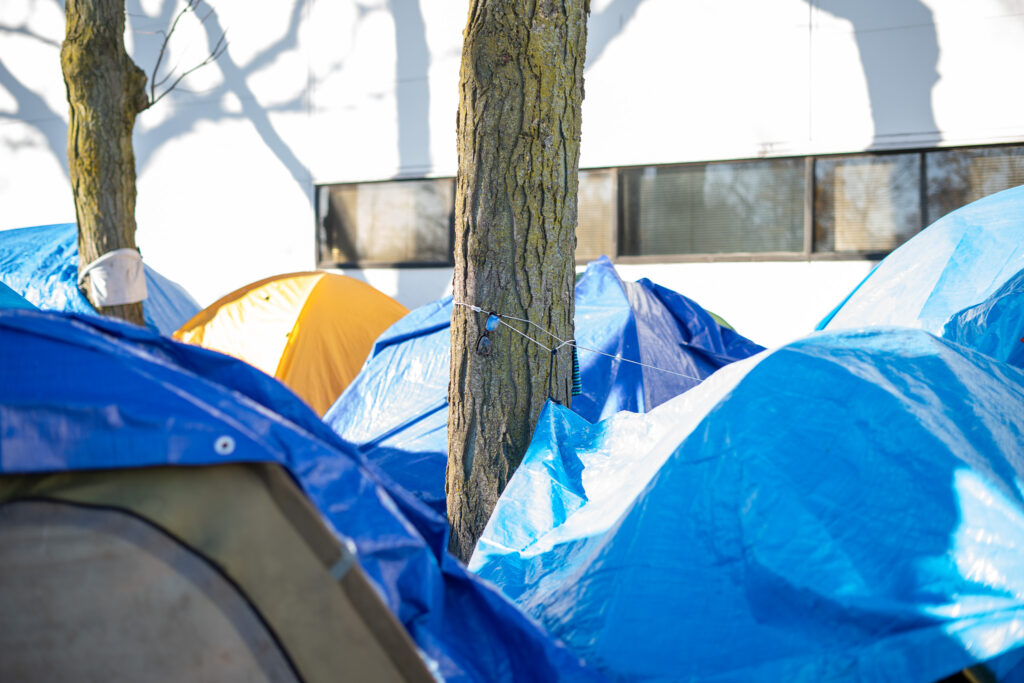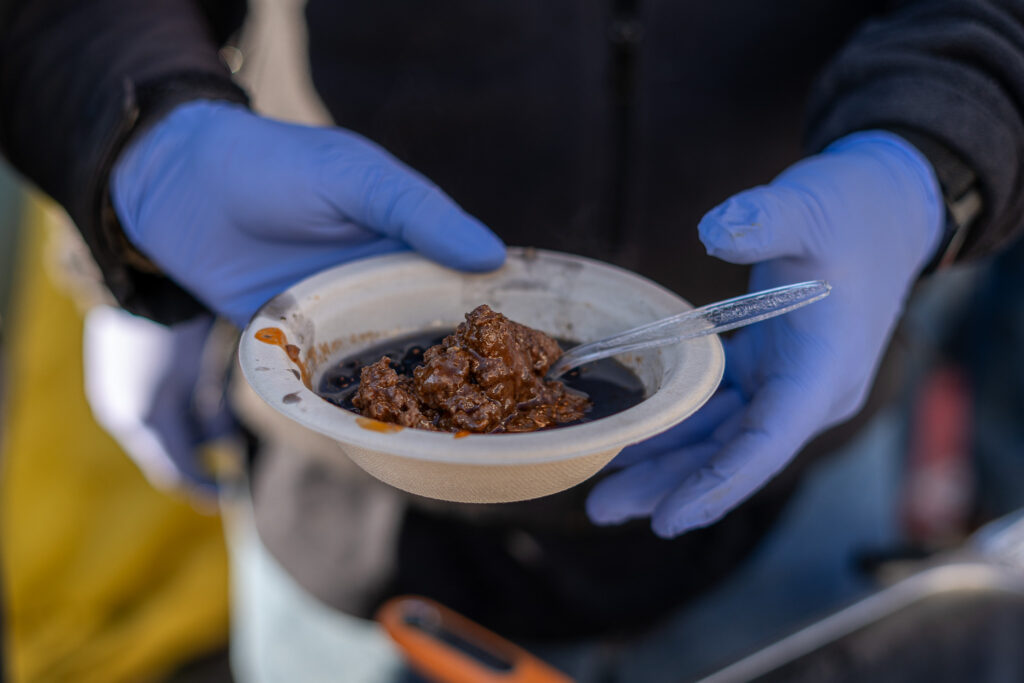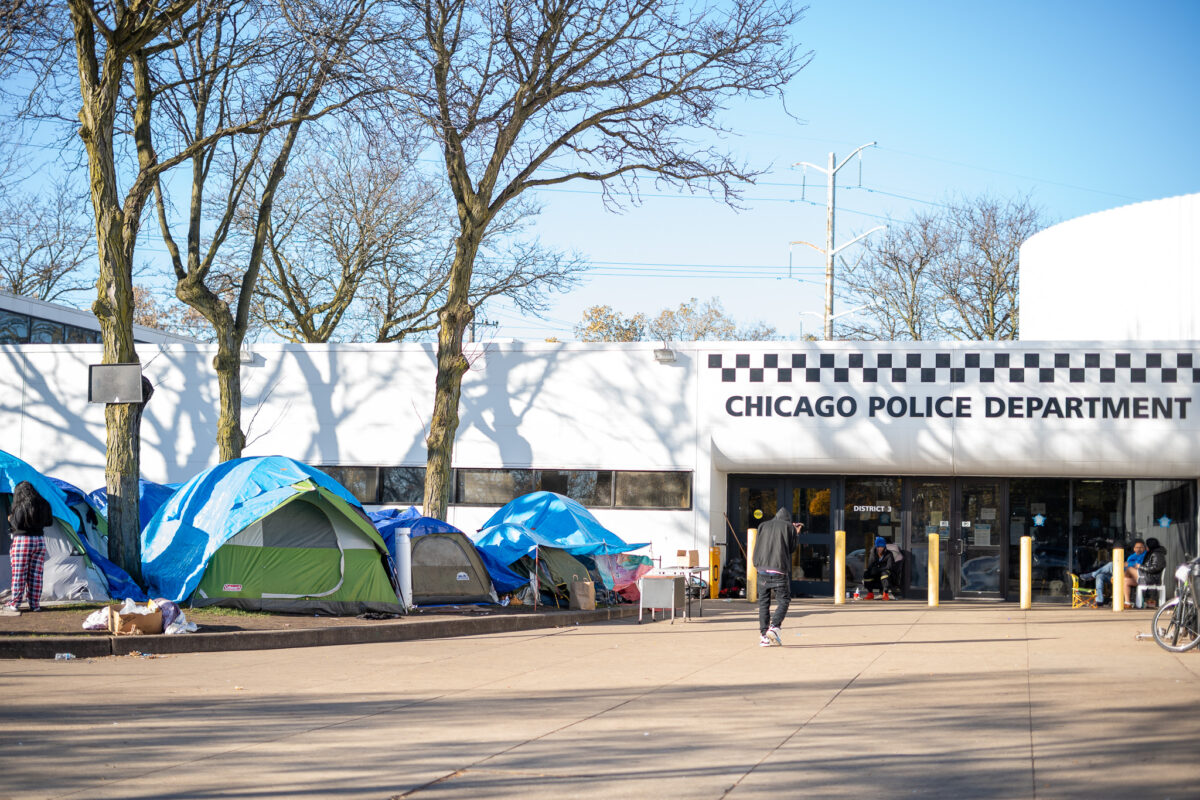We, like everyone, were on a very bad, difficult path,” said Fernando Medina.
Fernando, his wife Yesica Chirino, and their ten-year-old daughter arrived in Chicago in July of 2023 after the family was forced to flee their hometown of Coro, Venezuela. Here the family joined more than 20,000 fellow asylum seekers that have arrived in Chicago since August 2022, most of whom are fleeing political oppression and worsening economic conditions in Venezuela.
“You have to go in the name of God and get through it, but it’s not easy,” Fernando said. “What happens is that one has to get in the mindset that one has to get there, and one does get here. It’s about trying to find a way to help your family, to help oneself, even though sometimes it gets tough, but the good thing is that there’s always something good.”
While Chicago slowly implements plans for more permanent housing, communities such as South Side religious groups have been picking up the slack in ways that align with the teachings of their respective faiths: delivering food and clothes to local police stations and helping recent arrivals find jobs and shelter.
The Medinas are Catholic, a denomination that comprises more than sixty percent of Venezuela’s population according to the most recent census. When the family arrived in Chicago, they felt it was important to seek out a faith community that reflected their values. “I told my husband let’s go look for a church, let’s go, but there are so many churches here,” Yesica said. “We found this church in district nine at the police station. They were handing out fliers and that’s where it all started.”
The family began attending services at Bronzeville’s St. James Catholic Church, 2907 S. Wabash Ave., where Father Dennis Berry has opened the church’s rectory as a place of reprieve for migrant families. There they can wash clothes, take a shower, cook meals using supplies from the church’s food bank, or simply have a space to relax while their kids watch TV.
“The gift that I think the church can bring more than any other is the sense that God is with you. God loves you, God cares for you, the presence of the priest or the person from the church is a sort of symbol that we’re not alone,” Berry said.
Berry and other members of St. James have also been distributing winter clothes at the 1st and 9th District police stations where they first met the Medinas. According to the Associated Press, over 3,000 refugees are currently living in and around district police stations and the city’s two major airports as of October this year.

According to Dr. Saba Ayman-Nolley, president of the Hyde Park and Kenwood Interfaith Council, a coalition of various faith communities in the mid South Side, there were few resources to assist migrants when they began arriving in larger numbers this past summer. “People were basically told to just get off the bus and live at the street corner with nothing,” she said. “No planning, no programming was happening for them, initially.”
Ayman-Nolley and other council members began to notice that the city was only providing migrants with one meal a day. To make matters worse, the offerings at many local food banks were inaccessible to migrants without access to a stove or cooking supplies.
“And one of the Interfaith Council representatives from the Buddhist community, Tzuming Liao, was actually helping with taking food to the two police stations in our area,” Ayman-Nolley said. “So we talked to her to see how the Interfaith Council could help.” The council now serves weekly hot breakfasts for recent arrivals at the 2nd and 3rd District police stations.
First Unitarian Church in Hyde Park, 5650 S. Woodlawn Ave., is one of the religious institutions helping to organize volunteers for these weekly meals. According to First Unitarian Senior Minister Dr. David Messner, this type of service is about more than just providing someone with a warm plate of food. “If you invite someone to your table and listen to their story and, and create a human connection, that’s kind of our most humble conception of ministry, straight in connection where there was none. It is an inter-recognition of dignity.”
“As humans, we have a call to be in relationship with those around us. That’s the hard question, to me. I mean, with whom are you going to be in [a] relationship?” Messner said. “And surely, when people are lying in the street outside the house, we have an essential relation that we can’t deny, we can’t avoid. And so how do you, instead of denying, sort of live into that?”
Along with providing weekly meals, First Unitarian hosted a winter clothing drive for migrants that ended on November 12.
The city’s plans to house migrants through the winter are still in development. In September, Mayor Brandon Johnson announced his administration’s plan to open a winterized “tent city” for recent arrivals in collaboration with the private security firm GardaWorld Federal Services, a deal that would cost the city $29 million dollars.
Amidst growing concerns for migrant safety as temperatures drop, Concord Missionary Baptist Church in Woodlawn, 6319 S Kimbark Ave., is helping recent arrivals find permanent housing through their Home Away from Home Center.
“The mission of the Home Away from Home Center, really is to welcome those who have been fleeing the effects of war, violence, persecution, and political disruption from their countries, those that have been displaced. And our goal is to assist in the integration of these migrants into our society,” said Senior Pastor Dr. Kenneth Phelps.
Phelps created the center and runs it in partnership with Pastors David and Yolanda Cruz of Fathers Heart Church in Belmont-Cragin. Since February of 2023, the Center has been helping migrants find permanent housing through their Home Locator Service. Many migrants have been given housing vouchers by the city but there is still a reluctance on behalf of many landlords to rent to new arrivals. The service partners with asylum seeker-friendly real estate brokers to find local landlords who are willing to compromise on common renter credentials such as credit score or proof of income.
The Center also provides legal counsel to support immigration work permits, English as a second language classes, and material resources such as hygiene products and winter clothes. The Church itself holds bilingual church services every Saturday and Sunday. To donate winter clothing, email cmbc6319@gmail.com.

“Many of them are suffering from, you know, trauma from getting here. Many of them are homesick. Many of them have even had some bad experiences here. So there’s definitely opportunities for, you know, for spiritual counseling and chaplaincy services. So we’ve had great opportunities just to do life with them. I mean, everything from, we’ve had baby showers, you know, to help with whatever they need,” Phelps said. The church recently held a funeral service for Venezuelan migrant Luis Alberto Aguilar Peres, a resident of the former Wadsworth Elementary building shelter and frequent church congregant.
“It’s a criticism of the churches that we’re hypocrites, right. We don’t live what we preach. And we’re just trying to do that. We’re trying to live what we preach,” Phelps said.
“All of us who arrived here, immigrants, arrived sad,” Fernando Medina said. “You left your family, you left your land, you left your comforts, your home. And when you get here, you think America is going to work.”
Since arriving in Chicago, the Medinas were living at the 9th district police station before being moved to the shelter last month. Back in their hometown of Coro, in the Venezuelan state of Falcón, the Medinas owned a sweets shop. “I spent years [working] with the government also working in a school and we had a business,” Yesica said. “No, we weren’t rich, but we were doing well.” Now the family is looking for work and more permanent housing.
Despite a difficult path forward, the family remains optimistic. Their daughter has recently started at a nearby school. Through all of these challenges, their faith and the people at St. James Church has been a source of comfort and reprieve. “You arrive at the church and you don’t feel like there is discrimination. You arrive at the church and everything is tranquil, peaceful,” Fernando said. “It makes you feel good. We are looking forward to Sunday to come [to mass]. If they had mass every day, we would come every day.”
Interpretation and translation work by Leslie Hurtado.


Thanks for covering under-reported work by southside churches to provide much-needed s essential services for nearby migrants. When you are making Christmas donations to charities, hope readers will consider a contributions to Concord Missionary Baptist Church. Not a member but very impressed with their Home Away from Home Center.